| Srl | Item |
| 1 |
ID:
118714
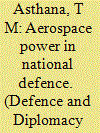

|
|
|
| 2 |
ID:
072601
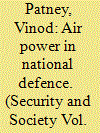

|
|
|
| 3 |
ID:
130105
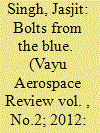

|
|
|
| 4 |
ID:
100985
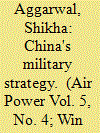

|
|
|
| 5 |
ID:
105470
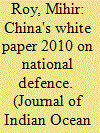

|
|
|
| 6 |
ID:
171010
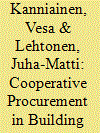

|
|
|
|
|
| Summary/Abstract |
The economic benefits of cooperative procurement derive from, at minimum, increased bargaining power relative to contractors and from economies of scale in production. There is, however, a puzzle: why is this kind of procurement so rare? This paper introduces a bargaining model with forward-looking expectations about the scale of procurement. It is shown that the price sensitivity of the scale of acquisition is favourable for the buying partnership, as it tends to push down the bargaining price. We propose several explanations for why it is hard to align buyers’ incentives: First, preferences for the properties of the products are country-specific, with divergent implications for national security. Second, countries that place a low value on the product have more bargaining power than those that value it highly, and may require a side payment in order to enter a partnership, while the partner may not have sufficient incentives to make such a payment. Third, the gains from cooperative procurement for the producer may not be sufficient to compensate for conflicting preferences among contractors. Fourth, while the future unpredictability of technologies or the future risks of deteriorating national security might support longer-term cooperative procurement, short-term opportunism tends to prevent long-term commitments.
|
|
|
|
|
|
|
|
|
|
|
|
|
|
|
|
| 7 |
ID:
130089
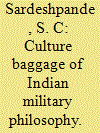

|
|
|
|
|
| Publication |
2014.
|
| Summary/Abstract |
The Gandhi an philosophy at ahimsa has attested the Indian attitude towards war and use of force. Nehruvian distrust ot India's armed forces and military leadership has coloured the dispensation national defence and the armed forces get. Historical, intellectual, cultural and administrative neglect oi the need for national defence cause deep concern. The people and their elected representatives have indifference to and inadequate knowledge of defence matters, their imperatives, demands and consequences. Bhutto said, "We will eat grass, but produce an atomic weapon". This awareness and determination does not sink in our Indian thought. Indian attitude resonates to its cultural ethos - waiting tor something to happen, somewhere, somehow, some time and somebody to take care, without designing things.
|
|
|
|
|
|
|
|
|
|
|
|
|
|
|
|
| 8 |
ID:
130650
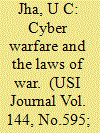

|
|
|
| 9 |
ID:
132847
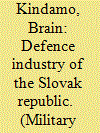

|
|
|
|
|
| Publication |
2014.
|
| Summary/Abstract |
The security and defence industy association of the Slovak republic is a national independent and non-profit association representing the interest of Slovakia's security and defence industry
|
|
|
|
|
|
|
|
|
|
|
|
|
|
|
|
| 10 |
ID:
103296


|
|
|
|
|
| Publication |
2011.
|
| Summary/Abstract |
The history of British defence reviews has been one of repeated disappointment: a cycle in which policy failure is followed by a period of inertia, giving way to an attempt at a new policy framework which is then misimplemented by the defence leadership. Each failed defence review therefore sows the seeds of its successor. With this in mind, in 2010 the new coalition government embarked upon an altogether more ambitious exercise: a strategy review comprising a National Security Strategy and a Strategic Defence and Security Review. This article suggests, nevertheless, not only that the 2010 strategy review looks likely to follow past performance, but also that it is coming unstuck at an unprecedented rate. This is a pity since the 2010 review had much to commend it, not least the adoption of a risk-based approach to security and defence policy-making. What is the explanation for this outcome? Is it that the British have, as some have suggested, lost the ability to 'do strategy', if ever they had it? The authors offer a more nuanced understanding of the policy process and argue that the coalition government in fact has a very clear and deliberate strategy-that of national economic recovery. Yet the coalition government cannot allow national defence and security to fail. The authors conclude with an assessment of the options open to the defence leadership as they seek to address the failing 2010 strategy review and suggest a variety of indicators which will demonstrate the intent and seriousness of the political, official and military leadership of the Ministry of Defence.
|
|
|
|
|
|
|
|
|
|
|
|
|
|
|
|
| 11 |
ID:
101134
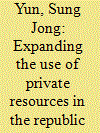

|
|
|
| 12 |
ID:
064609
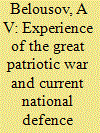

|
|
|
| 13 |
ID:
079054
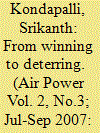

|
|
|
| 14 |
ID:
146573
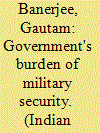

|
|
|
|
|
| Contents |
It needs no revelation that there is widespread consternation within the strategically committed community, the intelligentsia and the media over the growing obsolescence and declining operational capability of the ultimate cutting instrument of national power - the military force structure. Thus in spite of maintaining the third largest military force in the world, there is imposition of only a fractional deterrence upon the perennial adversaries while they keep jabbing hurtfully at rib of the Indian nationhood. The new political leadership is apparently intent on remedying that undesirable situation. Therefore, to turn its rhetoric into action, the NDA government has to acknowledge that there are two distinct aspects to the amelioration of that undesirable stage, and tackled these on priority if its political pronouncements are to gain respectability from the citizenry.
|
|
|
|
|
|
|
|
|
|
|
|
|
|
|
|
| 15 |
ID:
132859


|
|
|
|
|
| Publication |
New Delhi, KW Publishers Pvt Ltd, 2014.
|
| Description |
xxvi, 240p.Hbk
|
| Standard Number |
9789383649150
|
|
|
|
|
|
|
|
|
|
|
|
Copies: C:1/I:0,R:0,Q:0
Circulation
| Accession# | Call# | Current Location | Status | Policy | Location |
| 057843 | 358.400954/GUP 057843 | Main | On Shelf | General | |
|
|
|
|
| 16 |
ID:
102243
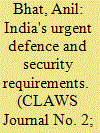

|
|
|
| 17 |
ID:
146376
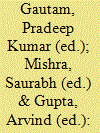

|
|
|
|
|
| Publication |
New Delhi, Pentagon Press, 2016.
|
| Description |
xix, 166p.hbk
|
| Contents |
Vol. III
|
| Standard Number |
9788182749092
|
|
|
|
|
|
|
|
|
|
|
|
Copies: C:2/I:0,R:0,Q:0
Circulation
| Accession# | Call# | Current Location | Status | Policy | Location |
| 058750 | 372.890954/GAU 058750 | Main | On Shelf | General | |
| 058751 | 372.890954/GAU 058751 | Main | On Shelf | General | |
|
|
|
|
| 18 |
ID:
132724
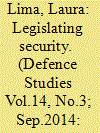

|
|
|
|
|
| Publication |
2014.
|
| Summary/Abstract |
This article examines the traditional conceptions of security and defence in Brazil. It does so by investigating their introduction in the political and legal vocabulary in Brazilian legislation. It further explores these terms as part of a project of militarization of the state and society which peaked during the Estado Novo dictatorship (1937-1945). Legislative sources and political writings of the time are thus used to corroborate the historical analysis and two main arguments: (1) conceptual innovations introduced in legislation allowed the armed forces to establish its monopoly over specific policy areas and, later, (2) to legally exercise control over civilian life. As such, it highlights the early relationship established between Brazilianess and development and argues that speaking security enabled authoritarian sectors to put forward their own project of development.
|
|
|
|
|
|
|
|
|
|
|
|
|
|
|
|
| 19 |
ID:
132848
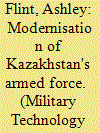

|
|
|
|
|
| Publication |
2014.
|
| Summary/Abstract |
By, 2018 it is predicted that Kazakhstan will spend a combined total of US$ 4.4billion annually on defence. It is also expected that defence spending of Kazakhstan will reach $2.6 billion during 2014. From this year onwards, annual defence spending is expected to continue its upward trend.
|
|
|
|
|
|
|
|
|
|
|
|
|
|
|
|
| 20 |
ID:
133048


|
|
|
|
|
| Publication |
2014.
|
| Summary/Abstract |
Post 9/1 t, homeland security got tast tracked in the US and it is generally believed that the mainland has not suffered any terrorist incident since then aside from the Boston bombings at 2013 and periodic 'lone wolt' attacks. Most countries have come to realise that homeland security has a much wider canvas than protection lrom acts of violence. Within India, the tabric at homeland security apparently comprises a host of dots that are yet to be fully connected; integration of the security sector, intelligence, surveillance, national net-centricity et al. Homeland security involves pro-active policies and implementation in terms at analysis, reorganisation, diplomacy, intelligence gathering, building and synergising the security sector, or whatever it
takes to proactively detend the homeland. It goes for beyond civil detence.
|
|
|
|
|
|
|
|
|
|
|
|
|
|
|
|